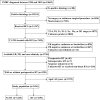Omission of adjuvant radiotherapy following breast-conserving surgery for elderly women with early-stage pure mucinous breast carcinoma
- PMID: 31685005
- PMCID: PMC6829954
- DOI: 10.1186/s13014-019-1394-x
Omission of adjuvant radiotherapy following breast-conserving surgery for elderly women with early-stage pure mucinous breast carcinoma
Abstract
Background: We aimed to ascertain population-based practice patterns and survival outcomes of postoperative radiotherapy following breast conserving-surgery (BCS) in elderly women (aged ≥65 years) with early-stage pure mucinous breast carcinoma (PMBC).
Methods: Patients aged ≥65 years diagnosed with T1-2N0 and hormone receptor-positive PMBC between 1990 and 2010 were identified from the Surveillance, Epidemiology, and End Results database. Binomial logistic regression, Kaplan-Meier method, Multivariate Cox proportional hazards models, and propensity score matching (PSM) were used for statistical analysis.
Results: We enrolled 3416 patients, including 1225 (35.9%) and 2191 (64.1%) in the no-radiotherapy and radiotherapy cohorts, respectively. The percentage of patients receiving postoperative radiotherapy following BCS was significantly lower after 2004 (59.5% between 2004 and 2010), relative to that before 2004 (71.1% between 1990 and 2003; P < 0.001). Before PSM, the 10-year breast cancer-specific survival (BCSS) rates were 98.1 and 93.2% for patients with and without postoperative radiotherapy (log-rank test, P < 0.001), respectively. In the PSM cohort, receiving postoperative radiotherapy was associated with better BCSS rates, with 10-year BCSS rates of 97.6 and 94.5% in patients with and without postoperative radiotherapy, respectively (log-rank test, P = 0.001). Multivariate Cox proportional analysis indicated that receiving postoperative radiotherapy was an independent factor associated with better BCSS before (P < 0.001) and after PSM (P = 0.001), relative to those not receiving postoperative radiotherapy.
Conclusions: This study shows a decreasing utilization of postoperative radiotherapy following BCS of elderly PMBC patients over time. However, postoperative radiotherapy following BCS should be administered for elderly women with PMBC owing to independent association with better survival.
Keywords: Elderly; Prognosis; Propensity score matching; Pure mucinous breast cancer; Radiotherapy.
Conflict of interest statement
The authors declare that they have no competing interests.
Figures



Similar articles
-
Effect of postoperative radiotherapy in women with localized pure mucinous breast cancer after lumpectomy: a population-based study.Radiat Oncol. 2022 Jul 7;17(1):119. doi: 10.1186/s13014-022-02082-7. Radiat Oncol. 2022. PMID: 35799256 Free PMC article.
-
Additional radiotherapy to breast-conserving surgery is an optional treatment for de novo stage IV breast cancer: A population-based analysis.Cancer Med. 2021 Mar;10(5):1634-1643. doi: 10.1002/cam4.3751. Epub 2021 Feb 14. Cancer Med. 2021. PMID: 33586323 Free PMC article.
-
Comparison of breast-conserving surgery without radiotherapy and mastectomy in the treatment of elderly patients with early breast cancer: A PSM and SEER database study.Cancer Med. 2023 Jul;12(14):15229-15245. doi: 10.1002/cam4.6210. Epub 2023 Jun 3. Cancer Med. 2023. PMID: 37269188 Free PMC article.
-
Mucinous breast cancer: A narrative review of the literature and a retrospective tertiary single-centre analysis.Breast. 2020 Feb;49:87-92. doi: 10.1016/j.breast.2019.11.002. Epub 2019 Nov 11. Breast. 2020. PMID: 31783314 Free PMC article. Review.
-
Pros and cons of radiotherapy omission in elderly breast cancer patients following breast conservative surgery.Transl Cancer Res. 2020 Jan;9(Suppl 1):S236-S241. doi: 10.21037/tcr.2019.10.39. Transl Cancer Res. 2020. PMID: 35117967 Free PMC article. Review.
Cited by
-
Effect of postoperative radiotherapy in women with localized pure mucinous breast cancer after lumpectomy: a population-based study.Radiat Oncol. 2022 Jul 7;17(1):119. doi: 10.1186/s13014-022-02082-7. Radiat Oncol. 2022. PMID: 35799256 Free PMC article.
-
Overall Survival in Patients with Mucinous Carcinoma of Breast: A Population-Based Study.Int J Gen Med. 2021 Dec 18;14:9991-10001. doi: 10.2147/IJGM.S343137. eCollection 2021. Int J Gen Med. 2021. PMID: 34984023 Free PMC article.
-
Race as a prognostic factor of breast mucinous carcinoma.J Cancer Res Clin Oncol. 2024 Dec 27;151(1):25. doi: 10.1007/s00432-024-06035-3. J Cancer Res Clin Oncol. 2024. PMID: 39729234 Free PMC article.
-
Efficacy and safety of adjuvant therapies in older patients with breast cancer: a systematic review and meta-analysis of real-world data.Breast Cancer. 2024 Sep;31(5):739-753. doi: 10.1007/s12282-024-01622-1. Epub 2024 Aug 1. Breast Cancer. 2024. PMID: 39085679
-
Trends in Radiation Dose to the Contralateral Breast During Breast Cancer Radiation Therapy.Radiat Res. 2023 Oct 1;200(4):331-339. doi: 10.1667/RADE-23-00014.1. Radiat Res. 2023. PMID: 37590492 Free PMC article.
References
-
- Pareja Fresia, Lee Ju Youn, Brown David N, Piscuoglio Salvatore, Gularte-Mérida Rodrigo, Selenica Pier, Da Cruz Paula Arnaud, Arunachalam Sasi, Kumar Rahul, Geyer Felipe C, Silveira Catarina, da Silva Edaise M, Li Anqi, Marchiò Caterina, Ng Charlotte K Y, Mariani Odette, Fuhrmann Laetitia, Wen Hannah Y, Norton Larry, Vincent-Salomon Anne, Brogi Edi, Reis-Filho Jorge S, Weigelt Britta. The Genomic Landscape of Mucinous Breast Cancer. JNCI: Journal of the National Cancer Institute. 2019;111(7):737–741. doi: 10.1093/jnci/djy216. - DOI - PMC - PubMed
MeSH terms
Grants and funding
LinkOut - more resources
Full Text Sources
Medical
Miscellaneous

